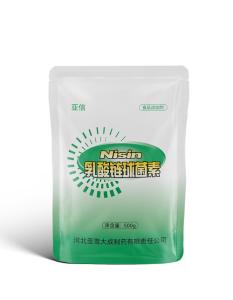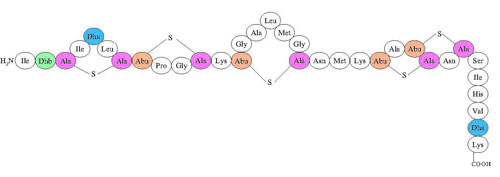

|
- Brand:shengxue
- Createtime: 2023-03-06
- Updatetime: 2024-10-23

Product:
Product name: Nisin
Supplier:Dacheng Pharma
CAS: 1414-45-5
Molecular formula: C141H228N41O38S7
Molecular weight: 3331
Molecular structure:
Nisin is a polypeptide consisting of 34 amino acid residues with a molecular weight of approximately 3,500 Daltons. Its molecular structure is composed of five rings (A to E) and three methyl-lanthionine (MeLan) bridges. The rings are formed by amino acids with unusual modifications, including dehydroalanine, dehydrobutyrine, and lanthionine. The MeLan bridges are formed by the addition of a sulfur atom to two neighboring amino acids, creating a stable and rigid structure. These unique structural features of nisin contribute to its antimicrobial properties and stability in various conditions.
Product function:
Nisin is a polypeptide substance produced by Lactococcus lactis. It is composed of 34 amino acid residues and has a molecular weight of approximately 3500 Da. Nisin can inhibit the growth of most Gram-positive bacteria and has a strong inhibitory effect on the spores of Bacillus, making it an efficient, non-toxic, safe, and side-effect-free natural food preservative widely used in the food industry.
Product features:
Nisin is effective in inhibiting the growth and reproduction of many Gram-positive bacteria that cause food spoilage, particularly heat-resistant Bacillus and Clostridium botulinum. It also has a strong inhibitory effect on the spores produced by these bacteria.
Nisin can lower the sterilization temperature of food, shorten the sterilization time, improve food quality, reduce nutrient loss, and extend the shelf life of food.
Nisin has a low usage level and is cost-effective.
Once ingested, Nisin is broken down by proteases in the body into various amino acids, leaving no residue. It does not cause antibiotic resistance and does not affect the beneficial bacteria in the human body.
SCOPE OF APPLICATION
Nisin brief introduction
Nisin is a natural antimicrobial peptide produced by lactic acid bacteria, primarily Lactococcus lactis. It is a type of bacteriocin that is used in the food industry as a preservative to prevent the growth of certain bacteria and fungi that can spoil food.
Nisin is a polypeptide consisting of 34 amino acid residues, with a molecular weight of approximately 3,500 Daltons. Its structure is composed of five amino acid rings that are connected by four peptide linkages. The amino acid sequence of nisin is highly conserved, and its structure is stabilized by intramolecular hydrogen bonds and disulfide bridges.
Nisin is effective against a wide range of Gram-positive bacteria, including Listeria monocytogenes, Staphylococcus aureus, and Clostridium botulinum. It works by binding to the bacterial cell membrane and disrupting its structure, leading to cell death.
Nisin has a number of advantages over traditional preservatives such as sorbic acid and sodium benzoate. It is heat-stable, pH-stable, and does not affect the flavor or texture of the food. Additionally, it has a long history of safe use in food and is approved for use in many countries.
Nisin is primarily used in the preservation of dairy products, meat products, and canned foods. It can also be used in the production of fermented foods such as cheese, yogurt, and sourdough bread. In recent years, there has been growing interest in the use of nisin in non-food applications, such as in the development of new antimicrobial coatings for medical devices and in the treatment of certain bacterial infections.
Overall, nisin is a versatile and effective antimicrobial agent that has the potential to play an important role in the preservation of food and the prevention of certain bacterial infections.
Furthermore, Nisin has been shown to have synergistic effects when used in combination with other antimicrobial agents, such as organic acids and bacteriophages, which can increase its efficacy and broaden its spectrum of activity against a wider range of microorganisms.
Nisin has also been investigated for its potential use as a therapeutic agent for various medical conditions, such as acne, urinary tract infections, and dental caries. It has been shown to be effective against various strains of bacteria, including antibiotic-resistant strains, and may offer a promising alternative to traditional antibiotics.
In addition, Nisin is a highly stable and long-lasting preservative that does not require refrigeration or other special storage conditions, making it ideal for use in a variety of settings and applications.
Despite its many benefits, there are some potential limitations to the use of Nisin as a preservative. For example, it may not be effective against all types of bacteria, and its use may be limited in certain applications due to regulatory restrictions or consumer preferences.
Overall, Nisin is a unique and versatile substance with a range of applications in the food, pharmaceutical, and cosmetic industries. Its selective antimicrobial properties, safety profile, and stability make it a valuable tool for improving food safety and human health, and ongoing research into its potential therapeutic uses may offer even more benefits in the future.
Nisin has also been studied for its potential to improve food quality and reduce food waste. Its antimicrobial properties can help to prevent spoilage and extend the shelf life of foods, reducing the need for preservatives and reducing food waste. In addition, it can help to maintain the nutritional quality of foods by preventing the growth of harmful bacteria that can cause nutrient loss.
Furthermore, Nisin has been found to have potential in the field of biotechnology. It can be used as a selective agent to help identify and isolate bacteria that have been genetically modified or engineered for various applications, such as the production of biofuels or bioplastics.
Research into the potential uses of Nisin is ongoing, and new applications for this versatile substance are being discovered all the time. For example, recent studies have shown that Nisin may have potential as a treatment for certain types of cancer, due to its ability to selectively target cancer cells while leaving healthy cells unharmed.
Overall, Nisin is a unique and valuable substance with a range of applications in a variety of industries. Its selective antimicrobial properties, safety profile, stability, and potential therapeutic uses make it an important tool for improving food safety, reducing food waste, and advancing biotechnology and medical research. As research into the potential uses of Nisin continues, it is likely that new and exciting applications for this versatile substance will continue to emerge in the years to come.
-
2023-03-13
How is Nisin produced?
Nisin is a naturally occurring antimicrobial peptide that is produced by certain strains of bacteria, particularly Lactococcus lactis. The process of nisin production involves the ...
MORE -
2023-03-14
How is ε-Polylysine hydrochloride produced?
ε-Polylysine hydrochloride, also known as ε-PL or Poly(ε-lysine), is a natural biopolymer composed of ε-lysine monomers. ε-PL is known for its antimicrobial properties and has...
MORE
- Tel:+8618231198596
- Whatsapp:18231198596
- Chat With Skype





